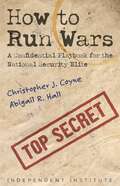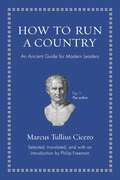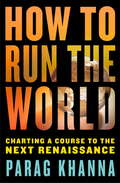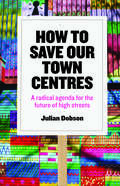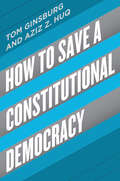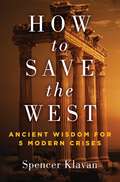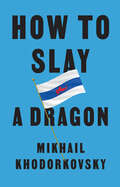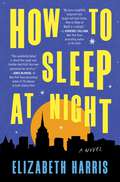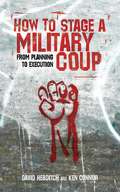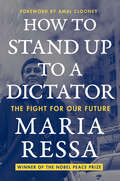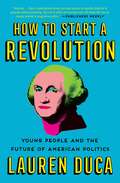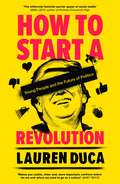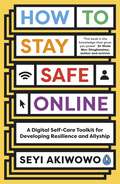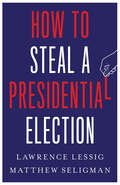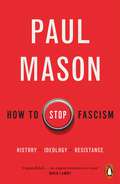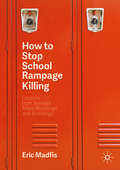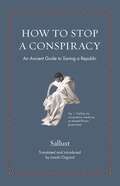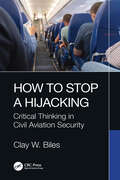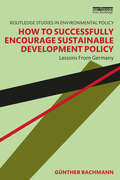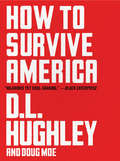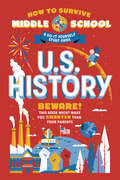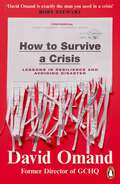- Table View
- List View
How to Run Wars: A Confidential Playbook for the National Security Elite
by Christopher J. Coyne Abigail R. HallA copy of the top-secret memo below recently came into our hands, and we thought we should bring it to your attention! &“Dear National Security Elite: In an ideal world, the public would simply accept whatever their leaders—you, in other words—told them. They would comply with restrictions and mandates, not as a matter of mere obedience, but as a matter of unquestionable patriotic duty. But we don&’t live in an ideal world. And with the fate of the world, especially the world&’s wars, in the hands of our enlightened, benevolent, and eminently responsible national security elite—in your hands, in other words—we can&’t afford to risk opening the conversation to an informed public. And we certainly can&’t risk asking for anything so antiquated as &“consent,&” either. Not when the stakes are this high. You simply must learn: How to control the narrative—every narrative—in your favor; How to completely capture the media and effectively quash dissent; How destroying liberty creates more liberty in the long (long) run; Why top-down economic planning, here and abroad, is your best friend; How to flout international, and of course domestic, law and get away with it; And much, much more... The danger with any book like this is, obviously, that it may fall into the wrong hands. If any member of the general public should happen upon these pages, the consequences would be fatal. After all, people may realize that the national security elite—you, in other words—are not, in fact, all-powerful harbingers of peace... They may realize that you are, literally, a force for good... armed and relentlessly attempting to bend the planet to your noble will. And that realization would be nothing short of disastrous. Don&’t let this book fall into the wrong hands!&” Merciless in their penetrating analysis, Christopher J. Coyne and Abigail Hall have written the satirical portrait of America&’s contemporary military-industrial complex. Drawing inspiration from the 1936 classic How to Run a War, by Bruce W. Knight, this book is a must-read for anyone who would know the truth about America&’s endless wars and the people who run them.... The truth might just set us free. It will certainly make you laugh. Then—really angry.
How to Run a Country: An Ancient Guide for Modern Leaders (Ancient Wisdom for Modern Readers)
by Marcus Tullius CiceroTimeless political wisdom from ancient history's greatest statesmanMarcus Cicero, Rome's greatest statesman and orator, was elected to the Roman Republic's highest office at a time when his beloved country was threatened by power-hungry politicians, dire economic troubles, foreign turmoil, and political parties that refused to work together. Sound familiar? Cicero's letters, speeches, and other writings are filled with timeless wisdom and practical insight about how to solve these and other problems of leadership and politics. How to Run a Country collects the best of these writings to provide an entertaining, common sense guide for modern leaders and citizens. This brief book, a sequel to How to Win an Election, gathers Cicero's most perceptive thoughts on topics such as leadership, corruption, the balance of power, taxes, war, immigration, and the importance of compromise. These writings have influenced great leaders—including America's Founding Fathers—for two thousand years, and they are just as instructive today as when they were first written.Organized by topic and featuring lively new translations, the book also includes an introduction, headnotes, a glossary, suggestions for further reading, and an appendix containing the original Latin texts. The result is an enlightening introduction to some of the most enduring political wisdom of all time.
How to Run the World: Charting a Course to the Next Renaissance
by Parag KhannaHere is a stunning and provocative guide to the future of international relations--a system for managing global problems beyond the stalemates of business versus government, East versus West, rich versus poor, democracy versus authoritarianism, free markets versus state capitalism. Written by the most esteemed and innovative adventurer-scholar of his generation, Parag Khanna's How to Run the World posits a chaotic modern era that resembles the Middle Ages, with Asian empires, Western militaries, Middle Eastern sheikhdoms, magnetic city-states, wealthy multinational corporations, elite clans, religious zealots, tribal hordes, and potent media seething in an ever more unpredictable and dangerous storm. But just as that initial "dark age" ended with the Renaissance, Khanna believes that our time can become a great and enlightened age as well--only, though, if we harness our technology and connectedness to forge new networks among governments, businesses, and civic interest groups to tackle the crises of today and avert those of tomorrow. With his trademark energy, intellect, and wit, Khanna reveals how a new mega-diplomacy, consisting of coalitions among motivated technocrats, influential executives, super-philanthropists, cause-mopolitan activists, and everyday churchgoers can assemble the talent, pool the money, and deploy the resources to make the global economy fairer, rebuild failed states, combat terrorism, promote good governance, deliver food, water, health care, and education to those in need, and prevent environmental collapse. With examples taken from the smartest capital cities, most progressive boardrooms, and frontline NGOs, Khanna shows how mega-diplomacy is more than an ad hoc approach to running a world where no one is in charge--it is the playbook for creating a stable and self-correcting world for future generations. How to Run the World is the cutting-edge manifesto for diplomacy in a borderless world.
How to Save Our Town Centres: A Radical Agenda for the Future of High Streets
by Julian DobsonHas the age of the internet killed our high streets? Have our town and city centres become obsolete? How to Save Our Town Centres delves below the surface of empty buildings and ‘shop local’ campaigns to focus on the real issues: how the relationship between people and places is changing; how business is done and who benefits; and how the use and ownership of land affects us all. Written in an engaging and accessible style and illustrated with numerous original interviews, the book sets out a comprehensive and coherent agenda for long-term, citizen-led change. It will be a valuable resource for policymakers and researchers in planning, architecture and the built environment, economic development and community participation.
How to Save a Constitutional Democracy
by Tom Ginsburg Aziz Z. HuqWe can’t afford to be complacent any more: “A formidable book . . . extremely rich in historical examples, case studies, and quantitative data.” —International Journal of Constitutional LawDemocracies are in danger. Around the world, a wave of populist leaders threatens to erode the core structures of democratic self-rule. In the United States, the tenure of Donald Trump marks a decisive turning point for many. What kind of president intimidates jurors, calls the news media the “enemy of the American people,” and seeks foreign assistance investigating domestic political rivals? Many think the Constitution will safeguard us from lasting damage. But is that assumption justified?Drawing on an array of other countries’ experiences, Tom Ginsburg and Aziz Z. Huq show how constitutional rules can both hinder and hasten the decline of democratic institutions. The checks and balances of the federal government, a robust civil society and media, and individual rights—such as those enshrined in the First Amendment—often fail as bulwarks against democratic decline. The sobering reality, they contend, is that the US Constitution’s design makes democratic erosion more, not less, likely. Its structural rigidity has had unforeseen consequence—leaving the presidency weakly regulated and empowering the Supreme Court to conjure up doctrines that ultimately facilitate rather than inhibit rights violations. Even the bright spots in the Constitution—the First Amendment, for example—may have perverse consequences in the hands of a deft communicator who can degrade the public sphere by wielding hateful language banned in many other democracies. We—and the rest of the world—can do better, and the authors conclude by laying out practical steps for how laws and constitutional design can play a more positive role in managing the risk.“This book makes a huge contribution to our understanding of how democracies erode and what institutional reforms would make it harder for authoritarian populists to entrench their power.” —Yascha Mounk, author of The People vs. Democracy“Whereas other recent books on the crisis of American democracy focus on what has gone wrong, Ginsburg and Huq provide us with clear-eyed proposals—including some bold constitutional reforms—for how to fix it.” —Steven Levitsky, New York Times–bestselling coauthor of How Democracies Die
How to Save the West: Ancient Wisdom for 5 Modern Crises
by Spencer KlavanThe coronavirus pandemic conferred enormous power on certain government officials. They have no intention of giving it up.In the space of a few weeks in early 2020, Americans witnessed the imposition of previously unimagined social controls by the biomedical security state—the unelected technocrats who suddenly enjoyed nearly absolute power to incarcerate, isolate, and medicate the entire population. In this chilling new book, a dissident scientist reveals the people and organizations that form the biomedical security state its role in the origin of the pandemic and shaping the government response why it is a threat to science, public health, and individual freedom what can be done to confront and defeat this new Leviathan When covid-19 broke out, Dr. Aaron Kheriaty&’s work put him on the front lines. Realizing that the mental, physical, and economic toll of lockdowns was catastrophic, he began to protest that the cure was worse than the disease—an intolerable heresy. When he refused vaccination because he had natural immunity from a previous infection, the University of California, Irvine, medical school fired him. He fought back, in the courts and in the media, and has become a reliable source of truth amid official obfuscation and censorship. Now it&’s time for all of us to fight back. The deadly and arrogant misrule of the biomedical security state must not become the "new normal."
How to Slay a Dragon: Building a New Russia After Putin
by Mikhail KhodorkovskyMikhail Khodorkovsky is one of the most astute observers of today’s Russia. Imprisoned for a decade in Russia’s prisons on politically motivated charges, he knows all too well the best and the worst of his country. He now lives in exile and, like many Russians who live abroad, he longs for the day when he can return to a free and democratic Russia.This book is Khodorkovsky’s account of what is happening in Russia today and what could happen in the future. Putin will not last forever: sooner or later, there will be a post-Putin era. But Russia’s history has been deeply shaped by an autocratic trap: a revolution against an autocracy has produced another autocracy, followed by another revolution and another autocracy, and so on. If Russia is to find its place as a constructive partner in a global community of civilized nations, then it has to escape this vicious cycle.How to Slay a Dragon is Khodorkovsky’s account of his own journey and of how the vicious cycle of Russian history can be broken. He charts a pathway towards a parliamentary federal republic which would enable Russia to become a free and democratic society, living in peace and without dragons.
How to Sleep at Night: A Novel
by Elizabeth Harris"By turns insightful, poignant and laugh-out-loud funny, How To Sleep at Night is a delight."— J. Courtney Sullivan, New York Times Bestselling author of Friends and Strangers“This wonderful debut is about the rough and tumble road that true love represents for all of us." --James McBride, #1 New York Times bestselling author of The Heaven and Earth Grocery Store“This debut sparkles with wit and insight. I found myself laughing and gasping in equal measure. A true testament to the complexities of modern relationships—this book is a must-read for anyone who's ever wondered how to bridge the gap between who we are and who we aspire to be." —Dolly AldertonA witty and whip-smart novel about love, marriage, and family ties stretched thin by ambition.Meet Ethan and Gabe. A devoted couple for years, they have successful careers, an adorable daughter, and a house in the New Jersey suburbs. Sure, they may have drifted to different ends of the political spectrum, but their marriage still has its spark. Then one night Ethan makes an announcement: he wants to run for Congress as a Republican—but only if he has progressive Gabe’s blessing. For weeks a slightly queasy Gabe struggles between supporting his husband and maintaining his own lefty ideals. He can feel himself slowly pulled under the tide of Ethan’s ambitions, even as he becomes widely known as a conservative spouse. In a nearby town, suburban mom Nicole wonders what happened to her younger self—living in New York City, freely dating men and women, and on a path to a career in the art world. Nicole feels like an accessory in her husband’s life and like she’s given up on the goals she had for herself. Then an old flame re-enters her life unexpectedly. That woman is Ethan’s sister Kate.A political reporter at a major newspaper, Kate has reached the top of her profession. But the adrenaline rush of chasing a story has lost its thrill. When Nicole—the woman who broke her heart—slides into her DMs just as her brother starts his controversial congressional run, Kate’s life is thrown into a tailspin that threatens to derail the success she’s worked so hard to achieve.“A sharply funny exploration of marriage and ambition, How to Sleep at Night has the feel of whispered secrets exchanged over cocktails with your smartest friend.”–Jenny Jackson, New York Times bestselling author of Pineapple Street“This wonderful debut is about the rough and tumble road that true love represents for all of us." — James McBride, #1 New York Times bestselling author of The Heaven and Earth Grocery Store
How to Stage a Military Coup: From Planning to Execution
by Ken ConnorFed up with taxes? Angered and disappointed by corrupt leaders? How to Stage a Military Coup lays down practical strategies that have proven themselves around the globe. David Hebditch and Ken Connor examine, with a critical eye, successful as well as failed coup attempts throughout the twentieth century with the aim of showing their readers just what it takes to swiftly and soundly overthrow a government. Exploring coups from Nigeria, to Cuba, to Iraq, and with true stories of SAS combat written by Ken Connor, the book gives an insightful glimpse into this violent and rarely-seen world of shifting power. How to Stage a Military Coup is a unique textbook for the armchair revolutionary, as well as a practical guide for the idealist with a soft spot for the sound of artillery fire. From evaluation of the political climate and investigation of potential allies, to recruiting and training personnel, to strategies for ensuring timely transfer of power, the book leaves no aspect of the coup unexamined. This new edition features a new introduction from the authors and a new foreword from an expert in the field, and also includes appendixes, notes, and a world map of coups.
How to Stand Up to a Dictator: The Fight for Our Future
by Maria RessaIntroduction by Amal ClooneyFrom the recipient of the 2021 Nobel Peace Prize, an impassioned and inspiring memoir of a career spent holding power to account. Maria Ressa is one of the most renowned international journalists of our time. For decades, she challenged corruption and malfeasance in her native country, the Philippines, on its rocky path from an authoritarian state to a democracy. As a reporter from CNN, she transformed news coverage in her region, which led her in 2012 to create a new and innovative online news organization, Rappler. Harnessing the emerging power of social media, Rappler crowdsourced breaking news, found pivotal sources and tips, harnessed collective action for climate change, and helped increase voter knowledge and participation in elections. But by their fifth year of existence, Rappler had gone from being lauded for its ideas to being targeted by the new Philippine government, and made Ressa an enemy of her country’s most powerful man: President Duterte. Still, she did not let up, tracking government seeded disinformation networks which spread lies to its own citizens laced with anger and hate. Hounded by the state and its allies using the legal system to silence her, accused of numerous crimes, and charged with cyberlibel for which she was found guilty, Ressa faces years in prison and thousands in fines. There is another adversary Ressa is battling. How to Stand Up to a Dictator is also the story of how the creep towards authoritarianism, in the Phillipines and around the world, has been aided and abetted by the social media companies. Ressa exposes how they have allowed their platforms to spread a virus of lies that infect each of us, pitting us against one another, igniting, even creating, our fears, anger, and hate, and how this has accelerated the rise of authoritarians and dictators around the world. She maps a network of disinformation—a heinous web of cause and effect—that has netted the globe: from Duterte’s drug wars to America's Capitol Hill; Britain’s Brexit to Russian and Chinese cyber-warfare; Facebook and Silicon Valley to our own clicks and votes.Democracy is fragile. How to Stand Up to a Dictator is an urgent cry for Western readers to recognize and understand the dangers to our freedoms before it is too late. It is a book for anyone who might take democracy for granted, written by someone who never would. And in telling her dramatic and turbulent and courageous story, Ressa forces readers to ask themselves the same question she and her colleagues ask every day: What are you willing to sacrifice for the truth?
How to Start a Revolution: Young People and the Future of American Politics
by Lauren DucaTeen Vogue award-winning columnist Lauren Duca shares a smart and funny guide for challenging the status quo in a much-needed reminder that young people are the ones who will change the world.A columnist at Teen Vogue, Lauren Duca has become a fresh and authoritative voice on the experience of millennials in today’s society. In these pages she explores the post-Trump political awakening and lays the groundwork for a re-democratizing moment as it might be built out of the untapped potential of young people. Duca investigates and explains the issues at the root of our ailing political system and reimagines what an equitable democracy would look like. It begins with young people getting involved. People like Alexandria Ocasio-Cortez, the youngest woman ever to be elected to Congress; David and Lauren Hogg, two survivors of the Parkland, Florida shooting who went on to become advocates for gun control; Amanda Litman, who founded the nonprofit organization Run For Something, to assist progressive young people in down ballot elections; and many more. Called “the millennial feminist warrior queen of social media” by Ariel Levy and “a national newsmaker” by The New York Times, Dan Rather agrees “we need fresh, intelligent, and creative voices—like Lauren’s—now as much—perhaps more—than ever before.” Here, Duca combines extensive research and first-person reporting to track her generation’s shift from political alienation to political participation. Throughout, she also draws on her own story as a young woman catapulted to the front lines of the political conversation (all while figuring out how to deal with her Trump-supporting parents).
How to Start a Revolution: Young People and the Future of Politics
by Lauren DucaIN NOVEMBER 2016, MANY PEOPLE WOKE UP TO A WORLD THEY DIDN'T RECOGNIZE: A NEW PRESIDENT WAS IN POWER. TWENTY-FOUR HOUR NEWS COVERAGE AND SOCIAL MEDIA UNFOLDED LIKE A HORROR FILM. ALL AT ONCE, EVERYTHING CHANGED.In 2016, Journalist Lauren Duca produced a piece for Teen Vogue titled 'Donald Trump is Gaslighting America'. It went viral and signaled a shift for millennials from political alienation to political participation.In How to Start a Revolution, Duca investigates and explains the issues at the root of an ailing political system and explores how millennials are the key to political change, providing knowledge and tools for how to make the most of a political awakening.'Lauren Duca is the millennial feminist warrior queen of social media. I cannot wait to hear more from this fearless and important new voice' Ariel Levy, author of Female Chauvinist Pigs'Lauren Duca is the kind of writer that makes you cackle, cheer, and, more important, confront where we are and where we need to go as a culture' Janet Mock
How to Stay Safe Online: A digital self-care toolkit for developing resilience and allyship
by Seyi AkiwowoA powerful, comprehensive guide to spotting, responding to and proactively defending yourself from online abuse - and learning how to be a good ally to those experiencing it.'The need-to-know, must-have and barrier breaking book on fighting online abuse that everyone must have a copy of' Dr Shola Mos-Shogbamimu'A book written from the front line of life online - heartfelt, heart-breaking, practical, brilliant' Richard Curtis ______________________________________ Digital spaces are a positive force for change, connection and community, but left unregulated, they are not always safe. Globally, women are 27 times more likely than men to be harassed online. Black women are 84% more likely to face online harassment than white. There has been a 71% rise in online disability abuse and 78% of LGBTQ+ people have experienced hate speech online. How to Stay Safe Online is an urgent, necessary digital self-care tool from leading activist for online equality Seyi Akiwowo. With a blend of practical advice, Seyi's personal experiences and interviews with Jameela Jamil, Hera Hussain, Laura Bates and Yassmin Abdel-Magied, this book will: * Provide practical tips on how to confidently navigate online spaces * Equip you with a range of responses to online abuse and how to effectively report * Teach you how to set boundaries and use the internet as a force for good* Empower friends, teachers and parents to help victims * Help you create your own digital self-care plan This will be the go-to guide to developing resilience, greater compassion for others and authentic allyship online. ______________________________________'Seyi Akiwowo's work to make the online world safer, especially for Black women, is not only powerful, it's necessary' Nova Reid 'This helpful book is a crucial companion' Emma Gannon 'No one should be using the internet without having read this book' Alex Holder 'Accessible, empowering and potentially life-changing [...] everyone should read' Laura Bates'Seyi is one of the most important voices of our generation [...] I hope this book gets added to the national curriculum' Poppy Jamie
How to Steal a Presidential Election
by Lawrence Lessig Matthew SeligmanFrom two distinguished experts on election law, an alarming look at how the American presidency could be stolen—by entirely legal means Even in the fast and loose world of the Trump White House, the idea that a couple thousand disorganized protestors storming the U.S. Capitol might actually prevent a presidential succession was farfetched. Yet perfectly legal ways of overturning election results actually do exist, and they would allow a political party to install its own candidate in place of the true winner. Lawrence Lessig and Matthew Seligman work through every option available for subverting a presumptively legitimate result—from vice-presidential intervention to election decertification and beyond. While many strategies would never pass constitutional muster, Lessig and Seligman explain how some might. They expose correctable weaknesses in the system, including one that could be corrected only by the Supreme Court. Any strategy aimed at hacking a presidential election is a threat to democracy. This book is a clarion call to shore up the insecure system for electing the president before American democracy is forever compromised.
How to Stop Fascism: History, Ideology, Resistance
by Paul Mason'For its historical depth, analytical vigour and mobilizational potential, this book is unparalleled ... every page is an urgent invitation to resist' David Lammy MP The bestselling author of PostCapitalism offers a guide to resisting the far rightThe far right is on the rise across the world. From Modi's India to Bolsonaro's Brazil and Erdogan's Turkey, fascism is not a horror that we have left in the past; it is a recurring nightmare that is happening again - and we need to find a better way to fight it.In How to Stop Fascism, Paul Mason offers a radical, hopeful blueprint for resisting and defeating the new far right. The book is both a chilling portrait of contemporary fascism, and a compelling history of the fascist phenomenon: its psychological roots, political theories and genocidal logic. Fascism, Mason powerfully argues, is a symptom of capitalist failure, and it has haunted us throughout the twentieth century.History shows us the conditions that breed fascism, and how it can be successfully overcome. But it is up to us in the present to challenge it, and time is running out. From the ashes of COVID-19, we have an opportunity to create a fairer, more equal society. To do so, we must ask ourselves: what kind of world do we want to live in? And what are we going to do about it?
How to Stop School Rampage Killing: Lessons from Averted Mass Shootings and Bombings
by Eric MadfisThis book tackles the important question of how we can understand and learn from the school rampage killings that have been prevented. In the flood of recent accounts and analyses of deadly school rampage killings that plague society and inspire widespread public fear, very little attention has been given to the incidents that almost were. Building on Madfis’ previous book, The Risk of School Rampage: Assessing and Preventing Threats of School Violence (2014), this vital work addresses key gaps in school violence scholarship through the examination of averted school rampage incidents in the United States and advances existing knowledge through ground-breaking insights from the latest research on mass murder, violence prevention, bystander intervention, disciplinary policy, and threat assessment in school contexts. This empirical study utilizes in-depth interviews conducted with school and police officials (administrators, counselors, security guards, police officers, and teachers) directly involved in averting potential school rampages to explore the processes by which threats are assessed and school rampage plots are thwarted. Madfis finds that many common contemporary school violence prevention policies and practices are ineffective at preventing rampage attacks and may actually increase the likelihood of their occurrence. Rather than uncritically adopting such problematic approaches, Madfis argues that schools must model prevention practices upon what has proven successful in averting potentially deadly incidents.
How to Stop a Conspiracy: An Ancient Guide to Saving a Republic (Ancient Wisdom for Modern Readers)
by SallustAn energetic new translation of an ancient Roman masterpiece about a failed coup led by a corrupt and charismatic politicianIn 63 BC, frustrated by his failure to be elected leader of the Roman Republic, the aristocrat Catiline tried to topple its elected government. Backed by corrupt elites and poor, alienated Romans, he fled Rome while his associates plotted to burn the city and murder its leading politicians. The attempted coup culminated with the unmasking of the conspirators in the Senate, a stormy debate that led to their execution, and the defeat of Catiline and his legions in battle. In How to Stop a Conspiracy, Josiah Osgood presents a brisk, modern new translation of the definitive account of these events, Sallust’s The War with Catiline—a brief, powerful book that has influenced how generations of readers, including America’s founders, have thought about coups and political conspiracies.In a taut, jaw-dropping narrative, Sallust pleasurably combines juicy details about Catiline and his louche associates with highly quotable moral judgments and a wrenching description of the widespread social misery they exploited. Along the way, we get unforgettable portraits of the bitter and haunted Catiline, who was sympathetic to the plight of Romans yet willing to destroy Rome; his archenemy Cicero, who thwarts the conspiracy; and Julius Caesar, who defends the conspirators and is accused of being one of them.Complete with an introduction that discusses how The War with Catiline has shaped and continues to shape our understanding of how republics live and die, and featuring the original Latin on facing pages, this volume makes Sallust’s gripping history more accessible than ever before.
How to Stop a Hijacking: Critical Thinking in Civil Aviation Security
by Clay W. BilesHijackings and bombings have plagued civil aviation since 1930 and air rage incidents are on the rise. While there is aircraft and inflight training available for air marshals, other first responders receive minimal training on inflight security awareness and protocols. There are no other resources currently available to flight crews or armed first responders that specifically address inflight security and how to address threats of disturbances on airplanes. How to Stop a Hijacking provides readers with fundamental principles on how to think more critically about onboard security threats. The aircraft cabin poses unique environment and security challenges, and first responders can apply security awareness and critical thinking skills to establish a safer environment in the cabin and airport for everyone onboard. The lessons in this book are driven with the central objective of teaching the reader how to counter inflight aggression and maintain tactical control of the cabin. Written by a former federal air marshal instructor, this book looks at the recent rash of air rage incidents and violence on airplanes, in addition to the real and ever-present threat of hijack or potential explosive device. How to Stop a Hijacking is a practical guide that offers methodological and tactically proven strategies for stopping violent acts onboard an aircraft inflight.
How to Stop a Hijacking: Critical Thinking in Civil Aviation Security
by Clay W. BilesHijackings and bombings have plagued civil aviation since 1930 and air rage incidents are on the rise. While there is aircraft and inflight training available for air marshals, other first responders receive minimal training on inflight security awareness and protocols. There are no other resources currently available to flight crews or armed first responders that specifically address inflight security and how to address threats of disturbances on airplanes.How to Stop a Hijacking provides readers with fundamental principles on how to think more critically about onboard security threats. The aircraft cabin poses unique environment and security challenges, and first responders can apply security awareness and critical thinking skills to establish a safer environment in the cabin and airport for everyone onboard. The lessons in this book are driven with the central objective of teaching the reader how to counter inflight aggression and maintain tactical control of the cabin. Written by a former federal air marshal instructor, this book looks at the recent rash of air rage incidents and violence on airplanes, in addition to the real and ever-present threat of hijack or potential explosive device.How to Stop a Hijacking is a practical guide that offers methodological and tactically proven strategies for stopping violent acts onboard an aircraft inflight.
How to Successfully Encourage Sustainable Development Policy: Lessons from Germany (Routledge Studies in Environmental Policy)
by Günther BachmannThis book builds on the insights of Günther Bachmann, former Secretary General for the German Sustainability Council, who spent almost 20 years advising the German government on sustainability policy. The book discusses his experiences in negotiating stakeholder statements at the highest national levels. Bachmann takes the reader behind the scenes of German sustainable policy and practice, whilst also comparing Germany with other national approaches. He tells the story of political events from his insider perspective, unfolding the narrative of sustainable development goals and how activists in their respective countries could and should relate to it. Furthermore, he suggests new lines of vision through the tangle of conference fatigue and buzzwords. The book argues that environmentalists often display entrenched attitudes that too often downplay success. The rhetoric of crisis and doom, if overstretched and reduced to alarm, paralyses action and innovation. Bachmann, who on the contrary argues positively and concretely, shows unusual but significant signs of hope and confidence in action and how these can be made effective in the politics of sustainable development. This book will be of global relevance to sustainability professionals and policy makers and will advise them on how to successfully move ahead with sustainability policies.
How to Survive America: A Prescription
by Doug Moe D. L. Hughley"Dispels the myth that people of color are somehow predisposed to poor health, blaming systemic injustice in the health care system." —New York Times Book ReviewLegendary comedian D.L. Hughley uses his "hilarious yet soul-shaking" (Black Enterprise) humor to confront racism's unjust impact on the health and wellbeing of Blacks and minorities White people love survival guides. But have you noticed they’re always about ridiculous activities in locations far from home, with chapters like “How to Survive an Avalanche" or "How to Live on Bugs in the Jungle.” Huh?!You know who really needs a survival guide? Black and brown Americans. For surviving their own damn country! Minority populations wake up every day in a battle for their health and safety. Thankfully, legendary activist-comedian D.L. Hughley offers How to Survive America, a fearless satire that exposes racism’s unjust toll on our bodies and minds.Even before COVID-19 disproportionately impacted minority communities, life expectancy for Blacks was a full three years less than for white Americans. The very air we breathe is more polluted, our water is more contaminated, our local food options are toxic, and our jobs are underpaid. Despite the obvious need, the quality of our health care is tragically inadequate. Our communities are statistically less safe than the average, and yet we’re terrorized by the law-enforcement and criminal-justice systems that are supposed to protect us, sending Blacks to prison at five times the rate of whites. Not least, our means of addressing these injustices—voting—is perennially under assault.It’s enough to drive you crazy. Well, guess what? According to Cigna, Blacks are 20 percent more likely to report “psychological distress” yet “50 percent less likely to receive counseling or mental health treatment.” It’s almost like the entire country has been structured with no regard for our welfare. Hmmm.Whether you’re Black, white, brown, or Asian, don’t leave home without arming yourself with How to Survive America!
How to Survive Middle School: A Do-It-Yourself Study Guide (HOW TO SURVIVE MIDDLE SCHOOL books)
by Rebecca Ascher-Walsh Annie ScavelliBEWARE—THIS BOOK MIGHT MAKE YOU SMARTER THAN YOUR PARENTS! Navigate the wilderness of middle school U.S. History with this hands-on, comprehensive study guide for 6th-8th graders!This highly illustrated, handy field guide makes learning an adventure inside and outside of the classroom. Study with helpful illustrations, detailed tables, diagrams, and maps, essential vocabulary lists, and expert knowledge presented in a fun, bold, and easy-to-understand format. Explore and master topics like: • Native American Peoples • European Colonies • Declaration of Independence • Civil War • Industrial Revolution • World Wars I & II • The Great Depression • The Cold War • Civil Rights • The Vietnam War • The War on Terror • and more! The How to Survive Middle School study guides cover essential middle school subjects with interactive texts, useful study techniques, and engaging illustrations that make information stick! The included reflective questions and write-in sections foster critical thinking and problem-solving skills, helping readers become independent learners. Each book is vetted by curriculum experts to perfectly complement middle school lesson plans. Other available subjects: World History, English, Math, and Science.
How to Survive a Chemical or Biological Attack
by Hamish de Bretton-GordonThis is an extract from the book Chemical Warrior: Syria, Salisbury and Saving Lives at War by Hamish de Bretton-Gordon (Headline Publishing Group, 2020).
How to Survive a Crisis: Lessons in Resilience and Avoiding Disaster
by David OmandFrom the former Director of GCHQ comes an invaluable guide to surviving crises - how to spot them early and lessen their devastating consequences - using the latest intelligence strategies'David Omand is exactly the man you need in a crisis' RORY STEWARTWe never know when a crisis might explode. Some 'sudden impact' events, such as terrorist attacks or natural disasters, blow up out of a clear blue sky. Other 'slow burn' crises smoulder away for years, often with warning signs ignored along the way until, as if from nowhere, the troops storm the palace.In How to Survive a Crisis, Professor Sir David Omand draws on his experience in defence, security and intelligence, including as Director of GCHQ and UK Security and Intelligence Coordinator, to show how you can detect a looming crisis and extinguish it (or at least survive it with minimum loss).Using gripping real-world examples from Omand's storied career, and drawing lessons from historic catastrophes such as Chernobyl, 9/11, the Deepwater Horizon oil spill and the WannaCry ransomware cyberattack, this empowering book is filled with practical advice on how to survive the multiplying crises of the future. Not every crisis need tip into disaster - if we have invested in personal, business and national resilience.This is an essential toolkit for our turbulent twenty-first century, as well as an exhilarating read for anyone interested in the state of our world - and how we might improve it.'This book is the instruction manual we all need' SIR ALEX YOUNGER, CHIEF OF MI6
How to Take the Ex Out of Ex-Boyfriend
by Janette RallisonSixteen-year-old Giovanna Petrizzo finds it hard enough to fit in. Three years since her family moved to Texas, she's still the newcomer compared to everyone around her. It doesn't help matters when her twin brother, Dante, takes on the mayor's son by running for class president. The least she could expect, though, would be for her boyfriend, Jesse, to support their cause. But Jesse's apparent defection triggers Giovanna's rash emotional side, and before she knows it, she's turned Jesse from the boy of her dreams to the ex boyfriend she dreams of winning back. In her trademark style, Janette Rallison delivers a laugh-out-loud romantic comedy that only leaves readers wanting more.
